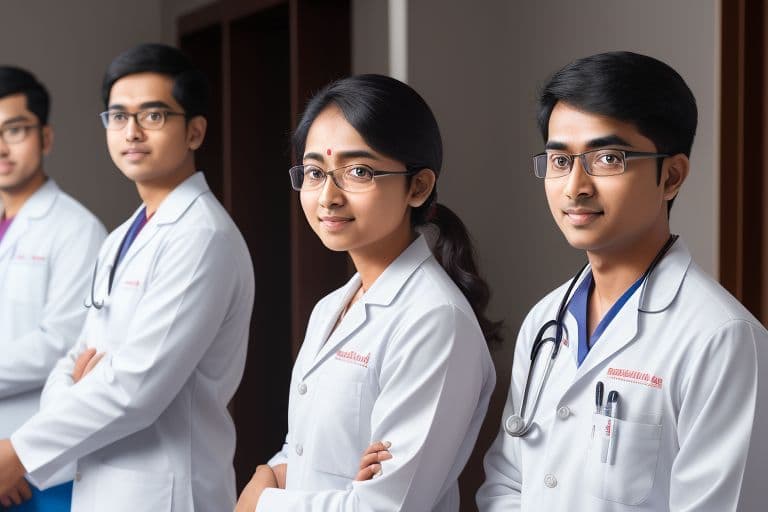Should Your Child Pursue a Career in Medicine like You?

Abstract
The traditional expectation for children of doctors to follow in their parents' medical footsteps is facing a paradigm shift. In India, a medical career, while prestigious, entails rigorous education and stiff competition. Today's medical landscape differs significantly from the past, influenced by technology, changing patient expectations, and increased competition. Consequently, children of doctors are exploring diverse career options with shorter paths to success, such as data science and engineering. Group medical practices are rising, while AI integration is altering diagnosis and treatment. The evolving field necessitates doctors' adaptability and acceptance of AI's potential. The decision for a child to pursue medicine should consider this dynamic landscape and the changing face of healthcare.Throughout generations, many doctors have cherished the dream that their children would follow in their footsteps and pursue a career in medicine. This dream is a common thread in our lives, showcasing the deep love and passion that doctors have for their profession. However, in recent times, a noticeable shift in this tradition has emerged. Some doctor-parents are now more open to the idea of allowing their children to make their own career choices, even if it doesn't lead to a life in medicine.
In India, the appeal of a medical career has always been strong, but it also comes with a demanding and highly competitive journey. The National Eligibility cum Entrance Test (NEET) is a testament to the intense competition and unwavering dedication required to secure a coveted spot in a medical college. The path to becoming a doctor, from pursuing an MBBS degree to potential specialization, can span over a grueling 15-year period, with many graduates entering the medical profession at the age of 31. Despite the time and effort invested, the medical career landscape is evolving in fascinating ways.
The Unconventional Path
While it may appear that children of doctors who own hospitals have a straightforward route to a medical career, this isn't always the case. Surprisingly, many offspring of hospital-owning parents choose to forge their own paths, often distancing themselves from the family's medical business. Furthermore, the patient base that frequented their parents' practices may not automatically transition to their children's medical ventures. This shift in perspective can be attributed to changing trends in medical practice and the growing competition in the field.
The modern medical landscape is significantly different from what it was a few decades ago. Healthcare has evolved into a complex and dynamic industry, with technology, patient expectations, and the role of healthcare providers rapidly evolving. As a result, the allure of a medical career for the younger generation may not shine as brightly as it did for their parents.
Nurturing Future Healers
Despite these challenges, parents should not be discouraged from encouraging their children to pursue a career in medicine. However, they should consider the evolving landscape. Non-medical professions are gaining equal appeal and offer shorter paths to success compared to the medical field. These alternative paths encompass various fields like data science, engineering, and entrepreneurship, which present attractive opportunities and faster routes to achievement.
Adapting to Changing Times
Non-medical professions also provide greater flexibility. Individuals can switch careers and explore entirely different avenues if they wish to do so. For medical professionals, transitioning to a different profession is not straightforward, but we are witnessing an increasing trend of such transitions. This shift may be attributed to the growing competition in the medical field and the desire for a more balanced work-life balance.
In the near future, more medical professionals may choose alternative career paths. In a rapidly changing world, adaptability and a diverse skill set can be invaluable assets. Physicians should explore opportunities in healthcare management, medical technology, and research to ensure their careers remain fulfilling and impactful.
The Changing Face of Medical Practice
One significant change on the horizon is the rise of group practices. This development could make the prospect of owning a hospital, even for doctor-parents, less attractive. Corporate hospitals are expanding into tier 2 and 3 cities, reshaping the healthcare landscape in those areas. Solo ownership and operation of hospitals may become more challenging, and doctors may transition from employers to employees under these corporate entities.
Furthermore, the increasing reliance on technology in medical practice may lead to investors playing a larger role, potentially turning hospitals into more industrialized entities. As a result, the patient-doctor relationship could undergo a paradigm shift, with patients trusting technology more than human interactions. These changes will bring new challenges and opportunities to the practice of medicine.
Embracing the AI Revolution
Undoubtedly, AI will have an impact on healthcare, and its role will be increasingly prominent in the near future. The future doctors should learn to accept and become part of this new reality.
Looking ahead, the medical profession is on the brink of a significant transformation with the introduction of Artificial Intelligence (AI). AI's impact on medicine extends beyond engineers implementing or augmenting its use; it's about the emergence of entirely new branches of medicine with AI integration. This may give rise to a new category of healthcare professionals - the "AI Doctors." To fully harness AI's potential, a deep understanding of AI's domain knowledge will be required.
AI can assist in diagnosis, treatment, and the analysis of vast amounts of medical data. It can reduce the workload on healthcare professionals, enhance accuracy, and improve patient outcomes. While AI may change the nature of certain medical roles, it can also create new career opportunities for those willing to embrace it. Doctors can work in conjunction with AI, using it as a tool to enhance their practice rather than seeing it as a threat to their profession.
Doctors as Pioneers of Change
In this evolving landscape, doctors themselves will play a pivotal role in harnessing AI's potential in healthcare. By doing so, they can pave the way for a future that promises more effective and beneficial outcomes.
As the boundaries of medicine continue to expand, the path to a medical career is changing, presenting both opportunities and challenges for aspiring doctors.
Conclusion
The question of whether your child should pursue a career in medicine should be made with careful consideration of the evolving landscape, the interests and aptitude of the child, and the potential for adaptation to new technologies. Medicine will always be a noble profession, but it's essential to equip the next generation of healthcare professionals with the skills and knowledge to shape the future of medicine in a rapidly changing world.
This Unlock the Future of Healthcare Management! 🚀🏥🌟
Is managing your hospital, clinic, or lab becoming a daunting task? Experience the ease and efficiency of our cutting-edge Management Software through a personalized demo.
